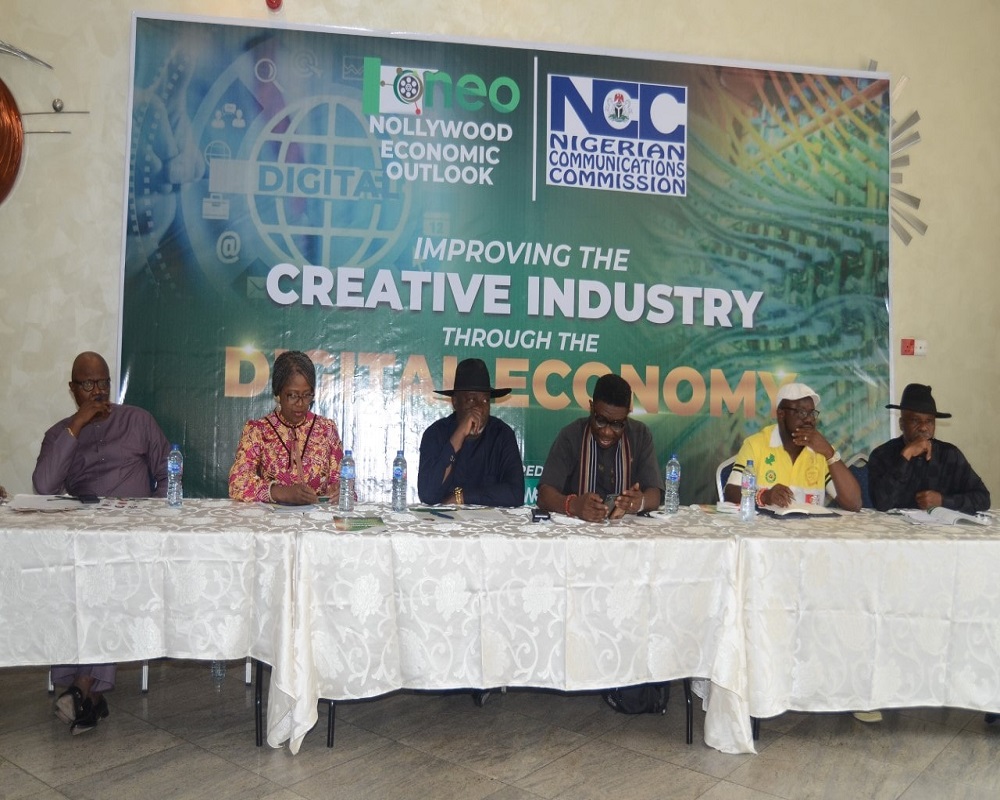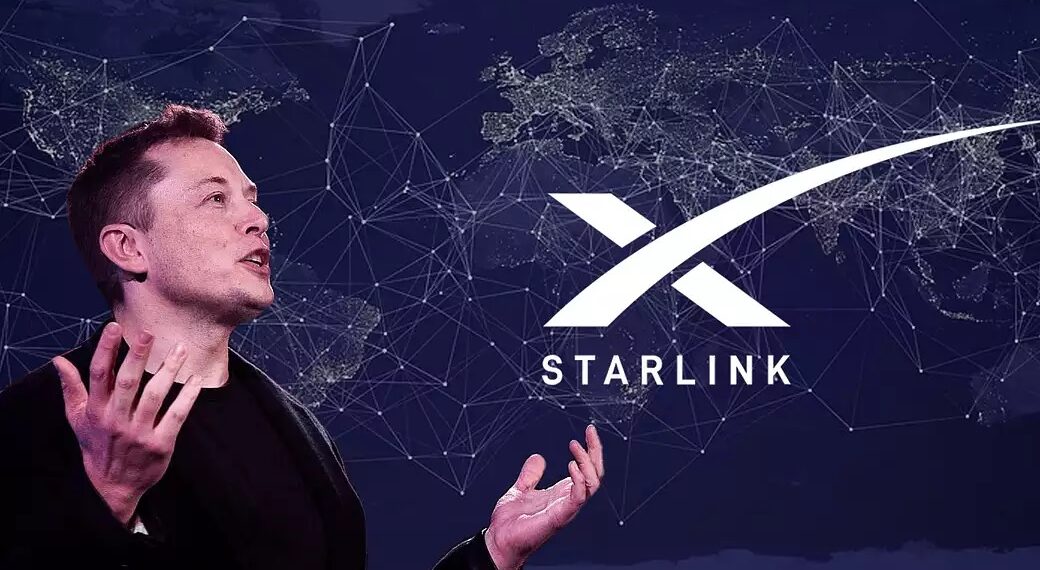Telecom
5G will Revolutionise Nigeria’s Creative Industry – Danbatta

The current efforts of the Nigerian Communications Commission (NCC) to facilitate deployment of the Fifth Generation (5G) technology will further catalyse the innovativeness and creativity of the entertainment industry in Nigeria and raise its productivity and contribution to the gross domestic product (GDP) to new levels. Prof. Umar Danbatta, Executive Vice Chairman and Chief Executive Officer of NCC,has said.

L-R: Idowu Johnson, Rep.for Commissioner,Tourism,Arts and Culture, Lagos State; Grace Ojougboh, Head of Media and Public Relations, NCC; Chief Zeb Ejiro OON, Chairman of the event; Victor Okhai, President, Directors Guild of Nigeria; Lancelot Imasuen,Nollywood Director and Sunny McDon, Veteran Director,Actor and Producer at the event
Danbatta, stated this in a keynote address delivered at the Nollywood Economic Outlook (NEO 2022) organised in Lagos recently, and well-attended by Nollywood personalities and other critical stakeholders in the creative industry.
The organisers of the NEO 2022 forum also presented the Award of “Best Agency in Government Sustainable and Development Agenda” to the Commission for its role in facilitating digital connectivity to fast-track Nigeria’s economic growth as well as accelerate attainment of the Millennium Development Goals (MDGs) in Nigeria.
Speaking on the theme: “Leveraging 5G Technology for the Advancement of Creative Industry,” Danbatta, who was represented by Grace Ojougboh, head of Media and Public Relations, said 5G technology will disrupt the media business models in the creative industry just as he emphasised that need for practitioners in the creative industry to leverage the power of 5G technology to expand the frontiers of the industry for the next phase of its growth.
“The 5G will revolutionize how content is produced, distributed, and consumed, unlocking existing technologies for wider audiences and enabling a new wave of applications.
“It will also enable broadcasters to transmit footage back to their base within a short period of time, thus creating more coverage opportunities,” Danbatta said.
He explained that 5G technology networks will transform businesses leading to higher productivity improvements via real-time flow of information.
“Consequently, this will permit the optimization of business functions and creation of new value chains for customers through advances in Internet-based web technology and search engines.
“This is expected to lead to the development and pervasiveness of Over-the-top (OTT) services,” he said.
Danbatta further stated that running 5G network, over-the-top (OTT) platforms and applications will also offer video content over the internet as against the traditional cable or satellite television.
This, he said, was because technologies enabled by 5G will utilize novel and innovative channels to enhance the experience of viewers.
“So, for the creative industry, 5G will also enable delivery of high-quality content direct to consumers by the broadcast industry at the touch of a button.
“Accordingly, it will offer users seamless experience when they stream videos on mobile devices (Smartphones and tablets) and web televisions that use solutions such as Chromecast, Apple TV and Amazon Fire TV, as well as Smart TVs,” the EVC said.
Danbatta told the audience that as demands for high-quality content and streaming increase, 5G connectivity presents the perfect opportunity to push the OTT viewer experience to the next level.
He said with super-fast 5G download speeds up to 10 times faster than the current networks and therefore, lower latency that will improve viewers experience of video on demand and make them to enjoy highly reliable services.
The 5G technology will allow the creative industry to better understand future requirements, explore new creative formats, build new mobile video capabilities, pursue strategic partnerships, and assess their data collection practices and database requirements.
“Information and Communications Technology has already made the world a global village due to its ubiquitous connection to remote locations across the globe. The 5G technology capabilities will make the world even smaller, thus enabling easy distribution of content across the globe in real time,” he stated.
Danbatta concluded by stating that 5G technology is set to redefine the way people live and work and will usher the much-talked-about Fourth Industrial Revolution (4IR) with its promise of a rapid social and economic development of the country.
Danbatta used the opportunity of the event to intimate the audience of the policy and regulatory efforts of the government, through the Federal Ministry of Communications and Digital Economy as well as the NCC, which have culminated in the licensing of spectrum resources for the deployment of 5G network in the country.
He asserted that disruptive innovations shaping the future of the world, such as; Mobile Broadband, Internet of Things, Cloud Computing, Autonomous and Near-Autonomous Vehicles, Artificial Intelligence, Augmented Reality, Block-Chain Technology, Robotics and Quantum Computing and more, are pivoted on telecommunications, especially the 5G technology.
Earlier, the Host of the programme and Executive Secretary, Board of Trustees of Actors Guild of Nigeria (AGN), Sunny McDon , said there had been all sorts of predictions about the introduction of 5G technology and the sheer number of devices that will become connected through its introduction in Nigeria.
He therefore advocated a focus on the impact on the creative industry, businesses and Nigeria’s socio-economic development.
Mrs. Uzamat Akinbile-Yussuf, Lagos State Commissioner for Tourism, Arts and Culture, who was represented at the event by Mr. Idowu Johnson, spoke on “Imperatives for Building Lasting Structures for the Sustenance of the Creative Industry.”
Telecom
How Starlink Took over Africa’s Largest Internet Market

Starlink has become a major internet service provider in Nigeria, driven by its reliable, high-speed access.

Its success has led to local internet service providers losing subscribers and raising concerns about unfair competition, according to restofworld.org, which reports global tech stories.
Critical institutions have avoided using Starlink’s network because of national security concerns.
In the sprawling electronic market of Lagos’ Computer Village, an item is flying off the shelves: the Starlink kit.
These satellite dishes, with their distinctive white faces and plug-and-play simplicity, represent more than just easy internet availability in Nigeria. They symbolize a technological coup in Africa’s most populous nation, where terrestrial broadband or wireless options are unreliable or inaccessible.
“I have about 20 pieces in the store, but I’m sure they will go before today ends or at the latest tomorrow morning,” Quadri AbdulFatai, a local electronics vendor who claims to have sold more than a thousand units in just 13 months, told Rest of World. “Starlink is very hot now.”
In January 2023, Nigeria became the first African market that Starlink entered.
Two years later, it now ranks second among internet service providers, which are classified separately from large telecom players by the Nigerian authorities.
With over 65,500 users at the end of the third quarter last year, Starlink is second only to 16-year-old Lagos-based ISP Spectranet, according to data from the Nigerian Communications Commission (NCC), the country’s telecom regulator.
At current growth rates, analysts predict Starlink will become Nigeria’s top internet service provider by mid-2026.
The secret to Starlink’s meteoric rise lies in a simple market reality: Nigerians are desperate for reliable, high-speed internet, which local providers have consistently failed to deliver, according to Temidayo Oniosun, managing director at Space in Africa, a market intelligence company focusing on the continent’s space and satellite industry.
Telecom companies and traditional ISPs in Nigeria suffer from frequent outages, sluggish speeds, and spotty coverage, especially in rural areas where terrestrial infrastructure is limited or nonexistent.
“Nigerians want high-speed and reliable internet, and Starlink’s technology offers that better than anyone else,” Oniosun told Rest of World.
“That’s why it is growing at an incredible speed. While the services aren’t the cheapest, launching with different pricing in different African markets shows that Starlink understands the markets.”
Starlink has made investments in building infrastructure in Nigeria. It has built a base station in Lagos and plans to add facilities in neighboring Abeokuta and Port Harcourt, Nigeria’s oil hub.
These stations will enable the company to beam low-latency internet directly to its rapidly growing user base throughout the country. Low latency is the ability of a network to respond with minimal delay.
Starlink’s success has unsettled competitors. When the company increased subscription prices last October, local operators cried foul, accusing regulator NCC of applying double standards by ignoring their requests for tariff reviews.
The regulator eventually granted local providers a 50% tariff increase in January, but customer perception had been damaged.
The regulator has fostered a fair and enabling environment that empowers all licensed operators, including Starlink, “to compete, innovate, and grow in response to market needs,” an NCC spokesperson told Rest of World.
The regulator has fostered a fair and enabling environment that empowers all licensed operators, including Starlink, “to compete, innovate, and grow in response to market needs,” an NCC spokesperson told Rest of World.
The regulator has licensed over 27 satellite-based communications services providers and issued over 90 landing rights to space segment operators, which include established providers like Eutelsat, SES, Viasat, and YahClick.
“In recent times, the commission has observed growing interest from both established global players and new entrants (especially those providing emerging satellite services) seeking to enter the Nigerian market,” the spokesperson said.
“This level of engagement reflects growing investor confidence in Nigeria’s digital economy and the enabling environment provided by the commission.”
Nigeria has 241 licensed ISPs, of which only 124 had active users as of the third quarter of 2024, collectively serving more than 300,000 subscribers, according to NCC data.
Starlink’s arrival has been nothing short of catastrophic for incumbents. Market leader Spectranet lost 8,428 subscribers between the last quarter of 2023 and the third quarter of 2024, while Tizeti lost about 700 in the same period.
While the losses appear modest, they are significant in the context of the small size of the market served by Nigeria’s ISPs.
The internet landscape is more dominated by mobile network operators MTN, Airtel, Globacom, and 9mobile, which collectively serve 132.4 million subscribers, providing both internet access as well as traditional phone services.
The playing field is fundamentally uneven, said Temitope Osunrinde, chief marketing officer at Tizeti.
The challenges for local operators include buying spectrum and building local capacity, hiring talent, and paying multiple taxes. If digging for fiber, they have to contend with multiple local government right-of-way permits and also area goons.
“You can’t compare Starlink with local companies because they don’t have to set up local capacity, nor hire and set up an office,” Osunrinde told Rest of World.
Gbenga Adebayo, chairman of the Association of Licensed Telecommunications Operators of Nigeria (ALTON), believes Starlink’s success reflects not a failure of local providers but “a challenging operating environment, which includes issues such as multiple taxes, multiple regulations, high right-of-way charges, infrastructure vandalism, and the rising cost of foreign exchange.”
Yet for ordinary Nigerians, these industry complaints hold little water compared with the tangible benefits of reliable connectivity. “For me, it was less speed and more concern about constant internet blackouts during meetings,” Olumide Lewis, a Lagos-based tech worker who recently installed Starlink, told Rest of World. “Since we bought our Starlink, we have had some peace of mind. We don’t spend our time thinking about the bad internet again because everything just works.”
Telecom
MTN Champs Lagos Continental Relays: A Celebration of Sportsmanship and Fun

MTN Champs Season 3 Lagos Continental Relays concluded on April 12, 2025, with a vibrant closing ceremony at the Yabatech Sports Complex.

This event marked a historic moment in Nigerian athletics, featuring the debut of the Olympics-approved mixed relays and showcasing exceptional talent across various track and field events.
The final day was a blend of intense competition and entertainment, drawing families, friends, and MTN Nigeria staff to the stands. Guests enjoyed music, games, and the much-anticipated MTN Staff Relays, where teams from different departments competed for medals and bragging rights. The Innovators emerged victorious, clinching gold in both male and female categories.
MTN executives also joined the fun, participating in 50m sprints and emphasizing the importance of physical activity. Chief Human Resources Officer, Esther Akinnukawe, highlighted the company’s Go M.A.D (Make A Difference) campaign, encouraging individuals to stay active and impactful in their fields.
The Lagos Continental Relays attracted over 2,500 entries from 155 schools, with participants competing in four age categories: Cadet (U-14), Youth (U-17), Junior (U-20), and Senior. The event not only celebrated athletic excellence but also reinforced MTN’s commitment to nurturing future Olympians and building a legacy of sports development in Nigeria.
Season 3 of MTN Champs continues with the grand finale scheduled to take place in Uyo at the Godswill Akpabio Stadium from April 30 to May 3.
Telecom
MTN, Meta Partner to Enhance Voice and Video Calling Quality

MTN Group, Africa’s leading telecommunications provider, has joined forces with Meta to improve the quality and reliability of voice and video calls on real-time calling applications such as WhatsApp across 12 MTN markets.

The collaboration, which began at the Mobile World Congress (MWC) 2024, focuses on optimizing application-aware networks and network-aware applications to deliver a seamless and high-quality user experience. By leveraging data analytics and conducting comprehensive testing, MTN and Meta have successfully developed solutions that enhance the interaction between mobile networks and real-time calling applications.
Nigeria, MTN’s largest market, was the first to implement these enhancements. Early results indicate a remarkable 50% improvement in key performance indicators (KPIs), significantly enhancing the user experience for MTN Nigeria mobile users.
“This implementation further demonstrates our commitment to enhancing our customers’ digital experience.
“We’re pleased with the remarkable improvement in our real-time communication services, reflecting our commitment to innovative customer solutions,” said Yahaya Ibrahim, Chief Technology Officer (CTO) at MTN Nigeria.
Diego Marí, Head of Network Ecosystems Engineering at Meta, added, “The collaboration allows us to deploy advanced solutions for an unparalleled real-time experience in Nigeria and showcases our dedication to elevating service quality and improving user experience, while striving for continued efficiency in traffic delivery.”
The partnership underscores MTN and Meta’s shared vision of delivering cutting-edge solutions to enhance digital communication across Africa.

 E-Business2 days ago
E-Business2 days agoNITDA Warns Against Fake Google Play Store

 General News2 days ago
General News2 days agoLagos Commences Integration of NIN with State Single Social Register

 E-Financial2 days ago
E-Financial2 days agoSEC Bans Unregistered Digital Asset Exchanges, Online Forex Platforms

 News2 days ago
News2 days agoNOA Uncovers Fraud by Banks, Universities in Students Loan Scheme

 E-Financial2 days ago
E-Financial2 days agoUBA Redefines Banking with Next-Gen PoS Terminals and Revamped MONI App

 E-Financial2 days ago
E-Financial2 days agoAfrica Loses $88.6Bn Yearly to Corruption- ECOWAS

 E-Financial2 days ago
E-Financial2 days agoNIBSS Heads to Court to Recover N4Bn Lost due to System Glitch

 General News2 days ago
General News2 days agoNigeria Records $6.83Bn Balance of Payments Surplus in 2024 Amid Economic Reforms

























